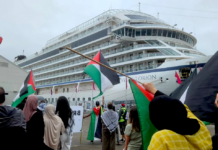New Zealand Foreign Affairs Minister Winston Peters has told the United Nations the situation in Gaza is an “utter catastrophe” and criticised the Security Council for failing to act decisively.
In a speech to the UN General Assembly in New York, Peters said Gaza was a “wasteland” and that New Zealand was “gravely concerned” that Israel may soon launch a military offensive into Rafah.
Peters condemned Hamas for its terrorist attacks on October 7 and since.
“All of us here must demand that Hamas release all remaining hostages immediately,” he said.
But he said the facts on the ground in Gaza were absolutely clear with more than 33,000 people killed, millions displaced and warnings that famine was imminent.
“Gaza, which was already facing huge challenges before this conflict, is now a wasteland. Worse still, another generation of young Palestinians — already scarred by violence — is being further traumatised.”
Peters said New Zealand was a longstanding opponent of the use of the veto at the UN.
Security Council ‘failed by veto’
“Since the start of the current crisis in Gaza, the veto has been used five times to prevent the Security Council from acting decisively. This has seen the Council fail in its responsibility to maintain international peace and security,” he said.
Peters acknowledged Israel’s “belated announcements” that it would allow more humanitarian aid into Gaza.
“Israel must do everything in its power to enable safe, rapid and unimpeded humanitarian access,” he said.
He called on all parties to comply with Resolution 2728 which demanded an immediate ceasefire for the month of Ramadan, leading to a lasting sustainable ceasefire.
“Palestinian civilians must not be made to pay the price of defeating Hamas,” he said.
The risks of the wider region being further drawn into this conflict also remained alarmingly high.
“We strongly urge regional actors, including Iran, to exercise maximum restraint.
“Israelis and Palestinians deserve to live in peace and security. There is overwhelming support in the international community — including from New Zealand — for a two-state solution.
“Achieving this will require serious negotiations by the parties and must involve a Palestinian state.”
This article is republished under a community partnership agreement with RNZ.
Article by AsiaPacificReport.nz






